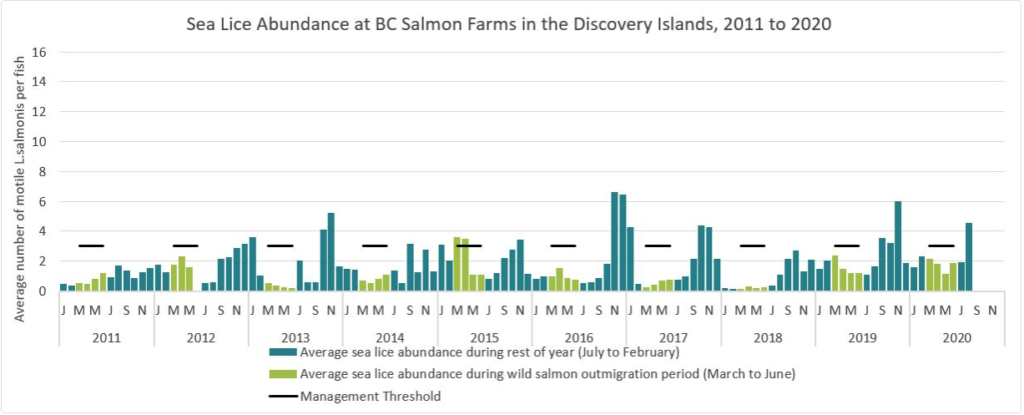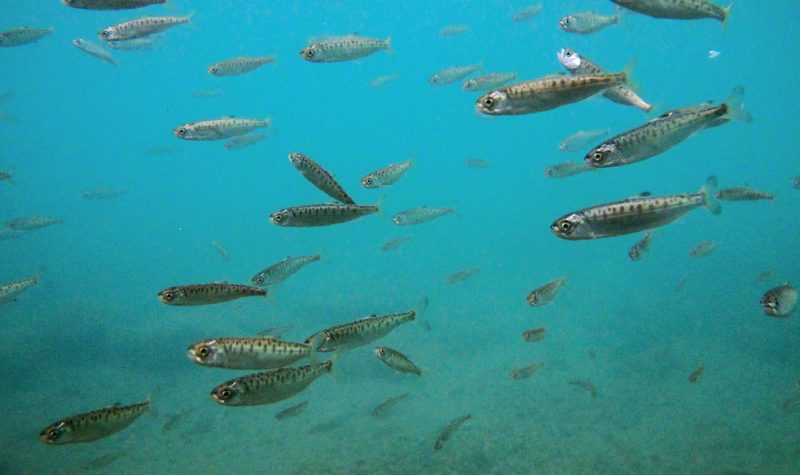By Roy L Hales
The licenses for all 18 salmon farms in the Discovery Islands are due to be renewed by December 18th, 2020.As these sites are within the traditional territories of the Holmalco, Klahoose, K’omoks Tla’amin, We Wai Kai (Cape Mudge), Wei Wai Kum (Campbell River) and Kwiakah First Nations, Fisheries and Oceans Canada (DFO) sent them letters stating they have a 60 day window to respond before a final decision is made.
A mountain of data to process within 60 days
Newly elected Hegus (Chief) John Hackett, of the Tla’amin First Nation, found himself confronted by, “a mountain of scientific data. Luckily we have very close relations with our sister nations, the Klahoose and Homalco. They got me up to speed very quickly. We share the same vision. We do not want the fish farm licenses renewed here because of the low sockeye returns. Basically, we’re just getting our data together and forming a united front. We’re just going to see what is going to happen this December 18th. That’s when they told us they are going to make a decision on renewing it. We are united in saying we do not want it there.”
Are all seven nations in agreement?
Cortes Currents asked, “Do you know if any of the other seven nations are actually in favour of the fish farms?
Chief Hackett replied, “I doubt they are. I’m not too familiar with all the seven nations. I’m not sure if any of them have employees that work at the fish farms. That might soften their approach to renewing it. I just know what our stance is.”
The Tla’amin, Klahoose, Homalco, and K’ómoks are among the 101 First Nations that signed a joint letter supporting the transition to a closed containment system.
A spokesperson for the K’omoks First Nation emailed, “We are not commenting at this time.”
None of the other Nations named by the DFO have replied to Cortes Currents’ queries.
Sea Lice
Chief Hackett described a joint effort by the Tla’amin, Klahoose and Homalco, “We teamed up together to hire someone to sort through the papers they gave us, to justify renewing the fish farms. It’s like, ‘hang on, wait a minute, let’s go through this.’ So we ended up retaining a fish biologist to go through the data.”
The biologists were concerned about the amount of sea lice found at salmon farms.
As Chief Hackett explained, “Sitting in with the biologists doing the research, they’re telling us that a lot of the sea lice affecting our wild stocks are affecting everything, and they are getting immune to the treatments. And the timing of the treatments does not match with the migration of the wild fry … If they timed the treatments sooner, it might take effect during the migration of the sockeye going out to the ocean. They are getting hit on the way out. Almost 95% of them are getting hit and if they are under one gram and have a sea louse, the mortality is 100%.”
Prior to announcing that the salmon farms posed minimal risk to sockeye migrating through the Discovery Islands, the DFO carried out nine assessments. Though sea lice is probably the most widely evidenced problem, is was not on the list to be considered.
The perceived threat
“It is not only the preservation of salmon, our traditional diet, that we are losing out on. We’re losing out on teaching our young ones how to capture the resource; how to preserve it through jarring it, smoking it. It is a tradition that we’ve had for thousands of years that is lost now because of poor management on the part of the DFO. It is really saddening,” said Chief Hackett.

the average number of sea lice per fish reported by fish farms within the Discovery Islands. (They are allowed up to three before actions must be taken) – Courtesy DFO
Meeting with the Minister
“We had a sit down with DFO Minister Bernadette Jordan, expressing our concerns. We got a report together, to present to her about the effects of renewing these fish farms and the spin-offs on many different levels: of how it affects the wild stocks, First Nations, our culture.“
Links of interest
- (Cortes Currents) Articles about, or mentioning, salmon farms
- (Cortes Currents) The Canadian Government has until December 18th to decide: 18 salmon farms
- (Cortes Currents) articles about, or referring to, salmon farms in the Discovery Islands
- (Wild First) First Nations Support for Transition to Closed Containment
- (Cortes Currents) A closer look at sea lice on 15 salmon farms
- (DFO) Average number of lice per fish on BC salmon farms 2011-2020
- (DFO) Industry sea lice counts at BC marine fin fish aquaculture sites
- (Globe and Mail) Scientist at Department of Fisheries and Oceans says Ottawa is too beholden to fish farm industry
- (Cortes Currents) The DFO responds to questions about Minimal risk
- (DFO) Summaries of the risk assessments for the Discovery Islands area
- (Cortes Currents) articles, pro and con, about salmon farms
- (Cortes Currents) Articles about, or mentioning, the DFO



